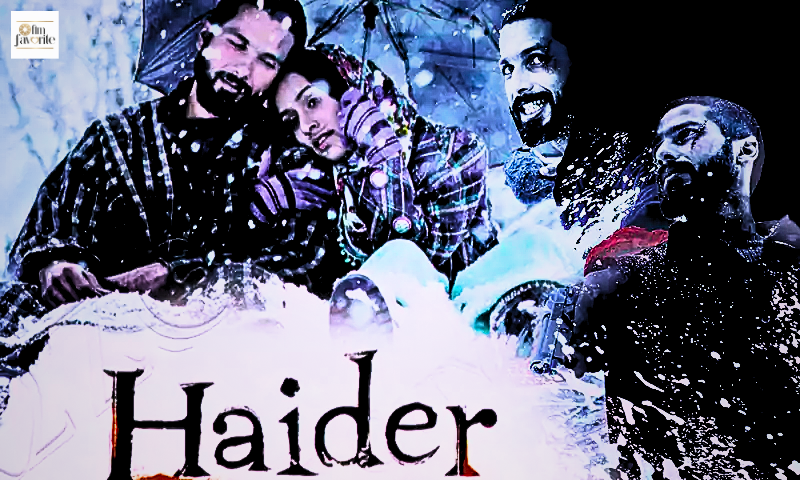Overview
A young man returns to Kashmir after his father's disappearance to confront his uncle - the man he suspects to have a role in his father's fate.
Synopsis
“Haider,” directed by Vishal Bhardwaj, unfolds in the turbulent setting of 1995 Kashmir, a region embroiled in insurgency and military occupation. It adapts Shakespeare’s “Hamlet” into a narrative that explores themes of familial betrayal, political upheaval, and the quest for justice amidst personal tragedy.
Story
Haider (Shahid Kapoor), a young student of poetry from Aligarh, returns to Kashmir upon learning of his father’s disappearance. Dr. Hilal Meer (Narendra Jha), a compassionate doctor, is suspected of harboring a militant, leading to his mysterious arrest and subsequent disappearance. Haider’s mother, Ghazala (Tabu), finds solace in the company of her brother-in-law, Khurram (Kay Kay Menon), while Haider grapples with the unraveling truths about his family. As Haider delves deeper into the circumstances surrounding his father’s fate, he confronts betrayal, political intrigue, and the complexities of love and loyalty in a conflict-ridden landscape.
Review:
Masterful Adaptation and Political Allegory
Vishal Bhardwaj’s “Haider” is a bold reinterpretation of Shakespeare’s “Hamlet,” ingeniously transposed into the socio-political context of Kashmir. The film skillfully integrates Shakespearean themes of vengeance, madness, and moral ambiguity with the harsh realities of Kashmir’s insurgency and the blurred lines between justice and revenge. Bhardwaj’s screenplay navigates these complex themes with finesse, creating a narrative that is both a gripping psychological drama and a profound commentary on the human cost of conflict.
Superlative Performances and Emotional Depth
At the heart of “Haider” is Shahid Kapoor‘s riveting portrayal of the titular character. Kapoor’s Haider embodies the essence of Shakespeare’s tormented prince, navigating a tumultuous emotional journey from grief-stricken son to vengeful avenger with remarkable depth and conviction. His performance captures the character’s inner turmoil and descent into darkness with haunting intensity, making Haider’s quest for truth and justice palpably poignant.
Tabu delivers a powerhouse performance as Ghazala, Haider’s conflicted mother caught between her loyalty to her family and her own desires. Tabu infuses Ghazala with a complex blend of vulnerability and strength, portraying a character torn apart by guilt and longing in a role that resonates long after the credits roll. Kay Kay Menon brings a chilling charisma to Khurram, portraying the duplicitous uncle with subtle malevolence and a veneer of charm that masks his darker intentions.
Visual and Aural Aesthetics: Capturing Kashmir
Pankaj Kumar’s cinematography is a visual feast, capturing the stark beauty and palpable tension of Kashmir’s landscapes with breathtaking precision. From sweeping vistas of snow-capped mountains to intimate, claustrophobic interiors, Kumar’s camera work enhances the film’s narrative depth and emotional impact. The cinematography not only serves as a backdrop but also as a character in itself, portraying Kashmir as both a haven of natural beauty and a crucible of political turmoil.

The film’s soundtrack, composed by Vishal Bhardwaj himself, complements the narrative with evocative melodies and haunting vocals. The use of traditional Kashmiri folk songs and ghazals adds layers of cultural authenticity and emotional resonance, underscoring the film’s exploration of identity and belonging amidst conflict.
Narrative Depth and Political Commentary
“Haider” excels not only as a psychological drama but also as a searing political commentary on the Kashmir conflict. Bhardwaj deftly weaves together personal and political narratives, offering a nuanced exploration of the human cost of violence and the moral ambiguities of justice in a war-torn region. The film challenges conventional notions of heroism and villainy, presenting characters whose motives are as complex and conflicted as the landscape they inhabit.
While the film’s narrative occasionally meanders in the second half, focusing more on Haider’s internal turmoil than the broader political context, this deviation serves to deepen the psychological portrait of its protagonist. However, some viewers may find the pacing uneven, particularly in balancing the personal and political dimensions of the story.
Personal Opinion
“Haider” emerges as a cinematic triumph—a film that not only honors its source material but also transcends it to offer a poignant and thought-provoking exploration of identity, loss, and the quest for justice amidst political turmoil. Vishal Bhardwaj’s direction is masterful, capturing the complexities of human emotion and political conflict with equal skill and sensitivity. The film’s compelling narrative, coupled with outstanding performances and exquisite cinematography, makes “Haider” a must-watch for cinephiles and admirers of bold, provocative storytelling.
What’s Good
- Innovative Adaptation: Vishal Bhardwaj’s decision to set “Hamlet” in Kashmir during the 1990s insurgency adds layers of political and emotional complexity to the narrative, making it both timely and timeless.
- Superlative Performances: Shahid Kapoor delivers a career-defining performance as Haider, capturing the character’s descent into darkness with remarkable nuance. Tabu’s portrayal of Ghazala is equally mesmerizing, imbuing her character with a haunting blend of vulnerability and strength.
- Visual and Aural Aesthetics: Pankaj Kumar’s cinematography beautifully captures the stark contrasts of Kashmir—its serene landscapes juxtaposed against the turmoil of its people. The haunting soundtrack, featuring reinterpretations of classic ghazals, adds a poignant layer to the narrative.
- Narrative Depth: Bhardwaj deftly weaves together personal drama with larger socio-political themes, offering a compelling exploration of identity, loyalty, and the moral ambiguities of conflict.
What’s Bad:
While “Haider” excels on many fronts, some viewers might find its pacing in the second half slightly uneven. The film’s exploration of Haider’s internal struggle occasionally takes precedence over the broader political narrative, potentially leaving certain themes underexplored.
Rating
In conclusion, “Haider” emerges as a cinematic masterpiece—a film that not only honors its source material but also challenges and enriches it with a searing commentary on the human condition amidst political turmoil. Vishal Bhardwaj’s vision, coupled with outstanding performances and a hauntingly beautiful portrayal of Kashmir, makes “Haider” a must-watch for cinephiles and admirers of bold, provocative storytelling.


1 thought on “Haider Movie Review (2014): Shahid Kapoor’s Kashmiri Masterpiece”